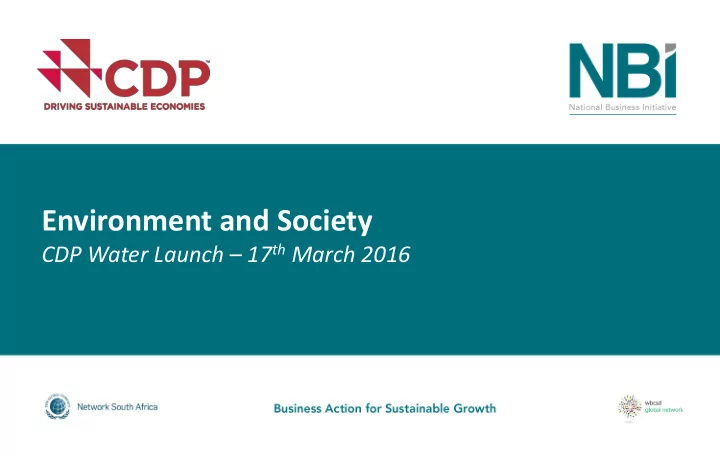

Environment and Society CDP Water Launch – 17 th March 2016
A big thank you The work on CDP Water and the infographics you will see today would not have been possible without the generous support of the Prosperity Fund of the British High Commission
Key Point Summary • The water context is not benign • The good news – those that respond are top performers • The big issues: – The water message is not sticky – Water is challenging to measure and understand – Companies assessment of the risk appears to be out of sync with other stakeholder opinion trends • Conclusion – is there much changing in water?
Water is top of mind for the media, government and the public in South Africa An expert group convened by the NBI concluded that while the drought is a serious short- term risk facing the country, there are more critical systemic issues in the water sector that need to be addressed to ensure long-term sustainability of supply in South Africa.
For business water is also critical… Water is also often recognised as a more signification risk than climate change Risks expected to materialise in Risks with medium to high the next 3 years financial impact
and has material financial costs
Fortunately the response from businesses disclosing to CDP is robust
The big issues The water message is not sticky 1
Although those that respond perform well, the engagement with CDP water is disappointingly low
Despite identifying water risk as a more urgent and more severe risk the response in water lags that of climate change
A review of companies who do not disclose to CDP reveal poor levels of disclosure The quality of water reporting of non- disclosers to the CDP water program does not provide the same level of detail and insight as provided by responding companies.
A reminder from 2011: We were concerned about undirected business activity Data from CDP Water, JSE 100 Report 2011
The big issues Water is challenging to measure 2 and understand
Most companies report on all three data points requested by CDP
There is a huge variation in approach to assessing risk and measuring data There remains significant variation in risk management approaches Companies use over 30 different methodologies to assess water risk
The big issues Businesses assessment of the risk 3 appears to be out of sync with other stakeholder opinion trends
Despite the urgency expressed by other stakeholders, leading companies view water as a less material risk than in 2014
Companies see water risk as predominantly a physical risk and not a regulatory risk
Companies still view risk as direct, rather than as a broader socio-economic and supply chain risk
The is a lack of consistency in risk identification An expert group convened by the NBI concluded that while the drought is a serious short-term risk facing the country, there are more critical systemic issues in the water sector that need to be addressed to ensure long-term sustainability of supply in South Africa.
What Next
Like climate change, 2015 water results will be available through various platforms CDP South Africa Water 2015: Infographics CDP South Africa Water: 2015 Executive Summary CDP Water Global Data Platform CDP Global Water Report 2015 http://globalwaterresults.cdp.net/data/
Companies need to carefully consider their exposure to water risks and opportunities, especially given the social and economic systems underpinning water • We must give water reporting and management the same status they give climate change • Disclosure of water outside of the CDP water programme needs to improve and we strongly believe that participating in the CDP programme will drive better reporting and better performance • We need a renewed focus on water as a shared risk, and as a long term systemic risk • We need to focus on the socio-economic and supply chain nature of water risk • We need to take the time to learn from and appreciate the work done by our leading water reporters • We need a more consistent approach to reporting water data and risk
A reminder from 2011 - The 7 Habits of Highly Effective Water Managers – Stephen J Nicholls • Seek and you will find • Set appropriate accountability levels • Participate in the CDP Water Disclosure Project • Work together • Set meaningful, quantitative targets • Work on a common accounting approach • Start today – we need more leaders!
Questions? The National Business Initiative Steve Nicholls and (NBI) is a voluntary coalition of Zarina Moolla South African and multinational M +27 (0) 83 786 5058 companies, working towards sustainable growth and E SteveN@nbi.org.za development in South Africa and the shaping of a sustainable future W www.nbi.org.za through responsible business action. M +27 (0) 82 395 9744 E ZarinaM@nbi.org.za
NBI Members
NBI Members
NBI Members
3rd Floor, Building D, Sunnyside Office Park, 32 Princess of Wales Terrace, Parktown, 2193 PO Box 294, Auckland Park, Johannesburg 2006, South Africa 0861 123 624 (0861 123 NBI) | Tel: +27 11 544 6000 | Fax: +27 86 505 5678 The National Business Initiative is a voluntary coalition of South African and multinational companies, working towards sustainable growth and development in South Africa and the shaping of a sustainable future through responsible business action. Since our inception in 1995, the NBI has made a distinct impact in the spheres of housing delivery, crime prevention, local economic development, public sector capacity building, Further Education and Training, schooling, public private partnerships, energy efficiency and climate change. The NBI is a global network partner of the World Business Council for Sustainable Development (WBCSD), the focal point of the United Nations Global Compact (UNGC) Local Network in South Africa and an implementation partner of the CEO Water Mandate, We Mean Business and the CDP. www.nbi.org.za www.facebook.com/NationalBusinessInitiative @NBISA
Recommend
More recommend